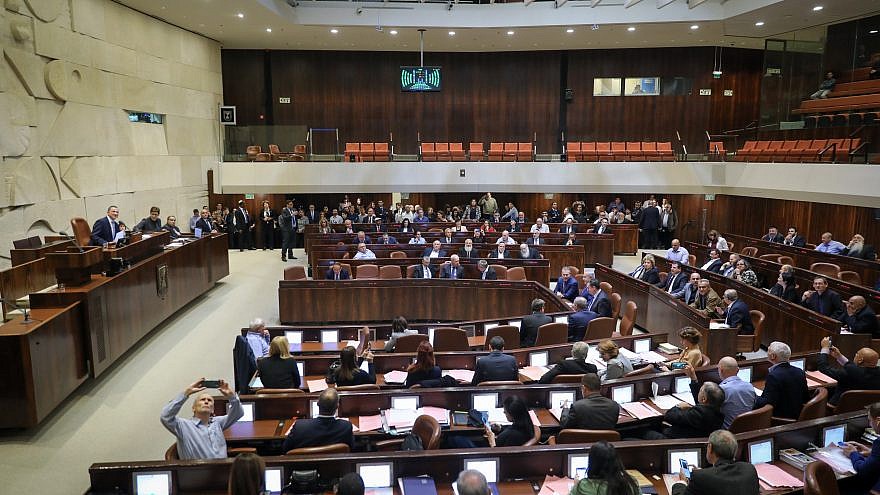The old expression is that for every two Jews, there are three political opinions. In Israel, that cliché can be extended to also include four or five political parties. That’s never been truer than now as preparations for the Jewish state’s next Knesset elections in April have gotten underway.
Israel’s proportional system for electing its parliament is responsible for the plethora of political parties. Based on pre-state ideas about the need for consensus and inclusion, the system has never produced a clear majority for any single party in Israel’s relatively short history.
That trend has been exacerbated in recent decades as each of the two major parties that have led all of the governing coalitions since Israel’s birth—Labor and Likud—have splintered with more ideological factions sprouting on the left and the right. In addition to that are sectarian parties representing the various religious sectors and Israeli Arabs. Centrist parties as an alternative to the left and right have been a regular feature of Israeli politics since 1977, when the desire for a non-ideological alternative to Labor resulted in the first Likud-led government headed by Menachem Begin. The centrists have followed a pattern of initial success, followed by collapse within one or two election cycles as these factions—often led by non-ideological former generals with little political experience—crashed and burned once they proved incapable of governing.
But the process of splintering has accelerated with parties on both ends of the spectrum imploding. On the left, the Zionist Union, which matched the remnants of Labor with supporters of veteran party-switcher Tzipi Livni, has broken up after Labor leader Avi Gabbay ditched Livni in a humiliating public smackdown. Meanwhile, ministers Naftali Bennett and Ayelet Shaked, who had grown tired of being chained to their more far-right religious and settler supporters, blew up their Bayit Yehudi Party. Moshe Kahlon’s Kulanu Party is also coming apart. In the center, former Israeli Army Chief of Staff Gen. Benny Gantz is poised to be the bright new star of 2019.
Keeping track of all of these competing egos isn’t easy, even for Israeli political junkies, let alone Americans. So for the sake of clarifying what’s at stake, I’ve come up with five key questions about what’s happening right now with Israeli politics.
First, why are the parties on the right splitting?
The implosion of Bayit Yehudi, which had been the strongest of Prime Minister Benjamin Netanyahu’s right-wing coalition partners, is a function of its leaders. The pair were forced out of the Likud by personal antagonism with Netanyahu, and profited from an awkward alliance with the rump of the old National Religious Party and other even more extreme personalities. But if Bennett is to ever achieve his ambition to succeed Netanyahu, he’s got to get back to the Likud. His goal is for his new party, which will attempt to bring together religious and secular voters, to do well enough to be part of the next government and then merge with Likud whenever Netanyahu falls.
Kahlon’s party is suffering the usual downturn new parties’ experience in their second go round. It will likely be diminished this time, as will Avigdor Lieberman’s Yisrael Beitenu, which represents the interests of voters from the former Soviet Union.
Even if some voters cast ballots for the smaller parties to keep Netanyahu honest, most voters on the right don’t want to diminish the Likud’s chances of winning the most seats and forming the next government.
Second, why are the parties of the left splitting?
The problem on the left is that as long as Israeli politics is still dominated by security concerns, advocates for more concessions to the Palestinians will remain in the minority. That puts pragmatists like Livni, who wants to join forces with Gantz or Yesh Atid’s Yair Lapid to defeat Netanyahu, at a distinct disadvantage. The left sees no reason to water down its message in pursuit of an illusory chance of power.
Third, can the centrist and left-wing factions unite in order to stop Netanyahu?
As things currently stand, the answer is no. In every poll, the parties currently in Netanyahu’s coalition are shown winning a majority in the next Knesset. And that’s ignoring the fact that some of the centrists like Gantz may wish to join the next government, rather than sulking in opposition with the left.
Fourth, is there a real alternative to Netanyahu?
Not a chance. Lapid is currently the runner-up in the polls, but he trails Netanyahu by a huge margin. Yet even after more than five years in the Knesset, few consider the former television personality to have the gravitas to run the country or deal with security threats on multiple regional and global levels. Gantz is viewed positively because he is fresh out of the army, though like other generals before him, the shine on his reputation will quickly evaporate. No one takes Livni, Gabbay or anyone on the left seriously when they talk about replacing Netanyahu.
Fifth, who is Netanyahu’s real foe?
The only person who can stop Netanyahu from continuing in office is Attorney General Avichai Mandelblit. If Mandelblit goes ahead with hearings to consider the recommendations of the police and the state prosecutor’s office to indict the prime minister on one or all three corruption charges currently pending against Netanyahu, it might lead to political chaos even if Netanyahu runs and wins the election. Armed with the public’s endorsement at the polls, the prime minister might stay in office while he fights the charges, but he will be severely diminished and would be unlikely to survive for long.
At that point, the lack of a natural successor in the Likud (Netanyahu chased away all potential successors like Bennett and Kahlon) will lead to another reshuffling of the political deck. But unless and until that happens, what American observers really need to know about Israeli politics is that Netanyahu is almost certainly going to win a fifth term as prime minister in April.


























